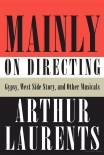Mainly on Directing, Arthur Laurents [best books for students to read TXT] 📗

- Author: Arthur Laurents
Book online «Mainly on Directing, Arthur Laurents [best books for students to read TXT] 📗». Author Arthur Laurents
Philadelphia was where we were having our paltry ten-day try-out. At the first preview, the ladies' room caught on fire, filling the theatre with smoke and panicking the audience; at the third preview, a dancer overran the stage and fell into the pit, smashing a saxophone and sending the musician who played it to the hospital, where he died of a heart attack; and the day of the second preview, Henry Lascoe, the veteran actor who played opposite Angela Lansbury, dropped dead in the wings. A director never knows where help will come from or in what form, but he had better be ready, even for an assist from death.
Unbeknownst to me, Henry had been sabotaging me with Angie. Her role was the commanding mayoress of the town, he was her fawning comptroller; she had the laughs, he had the feed lines. Henry convinced Angie that playing as aggressively as I directed her made her a mean bitch the audience disliked, and so it didn't laugh. The Achilles' heel of most actors—of most people— is the desire to be liked. In the movies, Angela Lansbury had made a career by being a dazzling villainess. Her reviews were always better than good (she was magnificent in The Manchurian Candidate), and she was liked by the audience as well. But believing Henry, she played passively. He got the laughs she didn't get, and the audience liked him, not her. Where was I, the director? Stupidly worried that because of lack of experience, certainly in musicals, Angela wasn't able to do on stage what she did so wonderfully, wickedly on screen. Henry rescued both of us by dropping dead. She was forced to drive her scenes and play the character. The laughs came; she heard them; she began having a good time; she gave the audience a great time—and the play got a lot better.
Moral: believe in the actors you cast. If they're not being as good as you thought they'd be, assume it's your fault and find the way to get to them and help them fulfill their potential without killing off the obstructive actor playing opposite them.
Another moral: to retain your own reason in a stressful time— which is what out-of-town with a musical always is—be careful to whom you listen. Kermit Bloomgarden, one of the producers of Whistle, a man who regularly produced both Arthur Miller and Lillian Hellman, asked me to heed the advice of a wise man. The man turned out to be his teenage son, on holiday from prep school. Another producer lectured me that the success of a show depended on seemingly small things. Which can be true—but with Whistle, the all-crucial small thing was a new dress for Lee Remick, the star. Not too long after her lecture, that producer was hospitalized with Alzheimer's.
Tales like these are routine for directors of musicals, particularly nowadays, when the number of producers is almost as large as the cast, and of that number, perhaps only one actually knows how to produce a musical. The tales are not important in themselves except as theatre anecdotes; what gives them real importance is how congenially the director reacts to the advice, for that affects how forthcoming the money will be to get that new dress, to have more rehearsal time, to market the show. Part of the director's job in this theatre we struggle with today is to direct the producers and the investors along with the actors.
Meanwhile, Lee Remick awaits my answer to her threat to walk.
Her challenge took me completely by surprise, but she was a movie star, and no woman becomes a movie star without being a killer. It's cultural, true of any woman in a position of power, political or corporate. Lee, never having been in a musical or having any real stage experience, might have been frightened and in need of reassurance. Whether she was actually frightened didn't matter; I had to treat her as if she was. So I smiled and said, “I'll bet you five dollars”—this was in the sixties—“you'll get the reviews in Philly and New York.”
The musical was in Angela Lansbury's bones. She was a far superior singer, dancer, performer, and a better actress as well. But the critics, how often are they blinded by a pretty face? Even the gay critics—especially the gay critics. Opening night, Lee Remick gave me a mounted five-dollar gold piece.
She wouldn't have if “Trumpets” had remained in the show. When I went into her dressing room to explain why I thought the song should be cut, I told her the truth, at least as I saw it—the only truth anyone can tell, except Fundamentalists, who know their truth is The Truth. I think a director must tell his truth. I think everyone in a working situation must, because only truth has a chance of helping. It doesn't have to hurt, as those who don't tell it profess to believe. It's a matter of how you tell it and why you're telling it. If you're really telling it to help, you'll phrase it right.
I didn't tell Lee she wasn't able to sing “Trumpets.” I told her the song was wrong for her voice; that that first speech of hers was an aria that got her such an enormous ovation, any song following so soon after was in unwinnable competition; that it left her in an impossible position, one in which, as the heroine of the play, she couldn't afford to be and one in which the play couldn't afford to have her. Left unsaid was that “Trumpets” was





Comments (0)